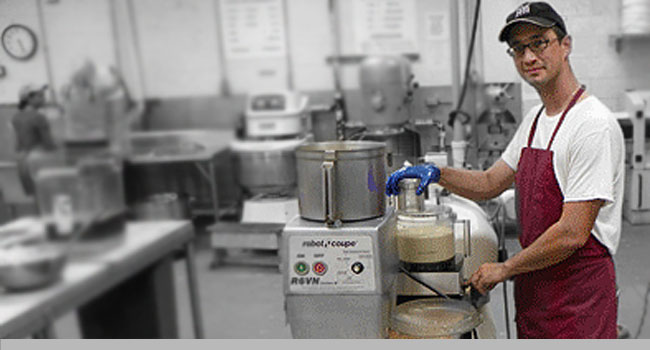A growing number of entrepreneurs are turning to this affordable, commercial grade, flexible kitchen space for food startups.
In 2010, Greek immigrant Yiorgos Samios needed a place to produce his Gogo’s Garlic Dip, his own take on skordalia, a traditional Greek condiment. Because of New York City’s stringent health code, he wasn’t allowed to use his own kitchen, and he couldn’t afford to lease commercial facilities either.
His answer: a kitchen incubator. Samios applied to and was accepted to work in the Entrepreneur Space. A 12,000-square-foot food and business incubator, it includes a 5,000-square-foot kitchen run by the Queens Economic Development Corp. and Mi Kitchen es su Kitchen, a consultancy.
One of many kitchen incubators throughout the United States, the E-Space, as it’s known, now provides commercial-grade kitchen facilities and business counseling to about 165 food entrepreneurs. (For more information about kitchen incubators, see resources, below).
Writer Anne Field talked to Seth Bornstein , executive director of QEDC, about the kitchen incubator.
Can you give us a brief description of the incubator at Entrepreneur Space.
Bornstein: We provide 24-7 kitchen facilities, along with business counseling and technical assistance. We opened in January 2011. It’s a huge commercial kitchen, with four stations, commercial-grade ovens—everything you need to make a product in quantity.
How did you come to start it?
Bornstein: About 12 years ago, the Consortium for Worker Education, a union-backed nonprofit group, got a grant to run a training program for unionized workers. They rented commercial kitchen space and outfitted it with great equipment. They did that for about five years. Then, Kathrine Gregory, a consultant who heads Mi Kitchen es su Kitchen and helps people start food businesses, started renting out the kitchen on evenings and weekends when it was empty. A few years later, however, the grant funding ended and she approached my board, which was looking to run an incubator in Queens. We agreed to take over the lease.
What do entrepreneurs need in order to apply?
Bornstein: We look for a business plan, business certificate and insurance. If you don’t have those things, our business counselors can help you. For your business plan you don’t need anything complex, just a page or two that shows you’ve thought through what’s required.
Can you tell us more about the process?
Bornstein: You’ll start out by seeing the director of our kitchen. If you have a business plan and all the necessary permits, you’ll sign a contract and give a deposit. There are shifts of about six to eight hours. The fee is between $175 to $249, depending on the shift. The overnight shift is about 6 ½ hours and the daytime shift is about eight hours. We don’t break them up. You need time to prep, to cook, to clean up. The biggest issue for us is scheduling. Everyone wants to use the kitchens on weekends. We ask that people schedule two weeks ahead of time. But we understand that you may have last-minute orders.
What other services do you offer?
Bornstein: We provide our clients with business counseling. Our counselors are here once a week and help with everything from sales to financing. We also hold classes run by professionals once or twice a month from September to June. And we hold a five-week class to help people figure out how to do a food business. It’s open to anyone.
How often do people use the facilities?
Bornstein: Some people use it for a few months and realize they don’t have the time to continue. They can get their deposit back or leave it, in case they want to come back at a later time. Some use it regularly. That’s the beauty of an incubator.
What advice do you have for immpreneurs thinking of starting a food business?
Bornstein: Do your homework. If you think you have great brownies, see what competition is out there. Why is your product going to be the one that’s going to make it? How will you sell it? Do you have the capability to market it? What about pricing? It’s so important to do research before you spend a cent.
New York City Kitchen Incubators
La Marqueta. Run by bakery Hot Bread Kitchen under the auspices of the New York Economic Development Corp., it’s located in a community marketplace in Spanish Harlem. Women, minority, or low-income food entrepreneurs are encouraged to apply. 1590 Park Avenue, New York, NY 10029. (212) 369-3331.
The Entrepreneur Space. A partnership between Queens Economic Development Corp. and Mu Kitchen es Su Kitchen, it provides commercial kitchen space, as well as business and technical counseling to food entrepreneurs. Space is available by shifts, 24/7. 120-55 Queens Boulevard, Kew Gardens, New York 11424. 718-263-0546.
Urban Horizons. It provides commercial kitchen space and is operated by The Women’s Housing and Economic Development Corporation (WHEDco) in Bronx, NY. It also provides hands-on business development support. 50 E. 168th Street., Bronx, NY10452. 917-498-3472.
Nationwide
Culinary Incubator. A web site with information about 236 kitchen incubators in the U.S.
National Business Incubation Association. The national association for incubators.

